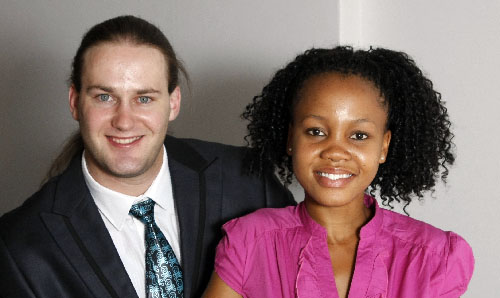 |
| Sannah Mokone and DW Bester |
Sannah Mokone and DW Bester were selected as Rhodes Scholars for 2011. It is the first time that the UFS has two students who have been awarded this sought-after scholarship in the same year.
Sannah is currently completing her B.Pub.Hons degree at the UFS and will read for an M.Sc. in Africa Studies at Oxford. DW is completing his honours degree in Actuarial Science and will read for a D.Phil.
The UFS is honoured to have not only one but two students who will join the ranks of past Rhodes Scholars such as Justice Edwin Cameron, Dr David Woods, Adv. Bram Fisher, Dr Loyiso Nongxa, Mr Isaac Shongwe and Mr Kumi Naidoo, who was recently appointed as the Executive Director of Greenpeace International.
The Rhodes Scholarships, arguably one of the most prestigious scholarships in the world, were founded in 1903 in the will of Cecil John Rhodes and cover the full costs of study at Oxford University.
While academic excellence is a pre-condition for consideration for the Rhodes Scholarship, these scholarships are unique in that Rhodes Scholars are outstanding young students who excel academically, but very importantly, demonstrate leadership, are committed to making a difference in the world, and have the energy to fulfil their ambitions.
In the Southern African region four scholarships are available for South African residents in general; as well as one for KwaZulu-Natal; and one each for the alumni of Diocesan College, Paul Roos Gymnasium, St Andrew’s College and the South African College Schools (SACS). There is a further scholarship available for residents of Botswana, Lesotho, Malawi, Namibia and Swaziland.
DW and Sannah were each awarded one of the South Africa-at-large scholarships.
Media Release
9 December 2010
Issued by: Lacea Loader
Director: Strategic Communication (actg)
Tel: 051 401 2584
Cell: 083 645 2454
E-mail: news@ufs.ac.za